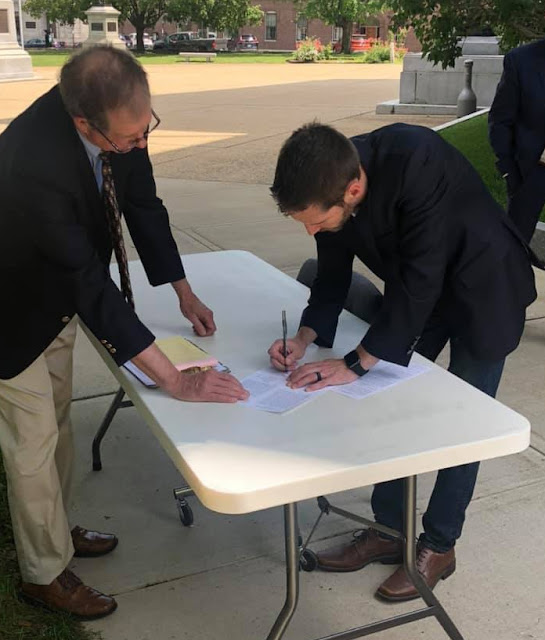 |
| Bloomberg photo of me looking serious in front of computers. |
As I wrote in my last post, I've decided that despite spending my entire career in technology (and almost all of it in cyber security), to run for public office. It's not a typical path, and it's not one I suspect is permanent. I outlined some of the reasons how I decided to run in my earlier post, so I won't outline them again here. What I did want to do, is spell out some of the things I think an engineer/nerd/tech-person/hacker/etc. brings to the table from a skill set/perspective point of view and some tech-focused goals. You can see my specific career trajectory at Linkedin, and although I've been fortunate to have a really cool career I honestly believe that many of the technical people I've worked with share most if not all of the aptitudes I describe below. A few of them are unique to cyber folks, and a few are also specific to hackers, but most I think apply across members of the engineering/technology fields.
Aptitudes
- Analytical mindset
- Ability to work with numbers/large data sets/statistics/budgets/finances
- Ability (love?) of reading specs, protocol docs, legal documents, prior art, etc.
- Ability to focus on facts and not just the emotional component to complex issues
- Strategic mindset looking at long term implications and not just short term
- Understanding of computers and technology and software
- How they're built and how to build them
- How to use them effectively
- How to hack/exploit them. And how to (mostly) secure them
- How to communicate about technical topics to non technical people
- How and when to apply technology and when to focus on people/process
- Importance of STEM education
- How technology drives jobs, education, economic growth, and organizational efficiency
- Ability to deal with people who passionately take a position and focus on common ground and how to bridge the communication divide. (Linux vs. Windows, Emacs/Vim, SW or HW problem, etc.!)
- How cyber security affects policy (voting, privacy, corporate liability, government IT spending, etc.)
- Strong work ethic
- Seeing new ways of doing things, inventing new ideas.
- Love of learning, digging into complicated topics and not looking for easy answers
- Dissatisfaction with the status quo, finding ways to improve processes.
- Ability to multi-task (I've been told ADHD is common in hackers, I know I have it!)
- Rational decision making, processes driven by facts/logic/data and not rhetoric/rumor/etc.
There are plenty of things engineers ALSO need to have to be an effective politician. A love of people. Good interpersonal/writing/presenting skills. Empathy/compassion. These came from genetics (my extroverted non-engineering mother complemented my Norwegian engineering father nicely!), faith (hard to say you love God if you can't love the people in front of you!) and life (you grow in compassion and empathy as you walk with people who are suffering, experience trauma/difficulties yourself, have children, etc.!)
Tech-Oriented Goals
- Help secure funding to increase broadband and 5G access across New Hampshire
- Review and enhance state policies, procedures and technical posture around cyber security, computerized voting, remote education, internal and citizen-facing government software, government networks/systems
- Ensure the state government works closely with federal agencies to receive and share cyber security threat information and develop policies/procedures for the state and support towns/county-level cyber security posture and programs
- Pursue right-to-repair legislation that ensures that citizens and companies who purchase products are allowed to repair/maintain those products
- Increase government transparency and electronic records access to the public
- Increase the implementation and security around electronic medical records
- Accelerate the digitization of legacy paper/analog based processes and procedures, such as requesting legal documents
- Support initiatives to develop enhanced technical literacy in young people (computer science, IT, science/math curriculum) and retraining programs to provide upward/lateral mobility, particularly with under-represented/minority groups
- Balanced, data driven approach to the increasing use of physical and online surveillance technologies and the inherent tradeoffs between increased security and decreased privacy
- Analysis of data-ownership models and the application of privacy-preserving technologies to encrypt/anonymize citizen data wherever possible
- Embrace of digital currency options and new technologies to enhance business/citizen experiences in the state (electronic tolling, online registration, etc.)
- Support robust, reliable, high quality online learning options Kindergarten through adult educational levels for accredited and unaccredited programs
I'm sure there are plenty of other things that will come up, and of course my focus isn't purely on technical topics. (Low taxes is one I'm fond of!) But that's a good list of things I think about and a unique POV to bring to the capital leveraging my tech background.
Would love to see others in the tech/security community also get involved in public service, either serving in government or even better volunteering for roles such as poll workers, running for local/state office and supporting good people in your communities who do run. If anyone has questions for me about the process, the campaign, issues, etc. feel free to reach out. Easiest way is email or Twitter.
If anyone wants to volunteer or donate to my campaign, I need a ton of support! From my last post:
"I discovered that the senator currently representing the district (who by all accounts is a very nice guy) is receiving almost $140k a year from a special interest group, lists government "lobbying" and "representation" among his official duties, doesn't recuse himself from matters related to the special interest and in fact puts out press releases bragging about the millions of dollars in benefits that flow back to the special interest. Not coincidentally, the special interest also contributed over $75k to his campaign"

